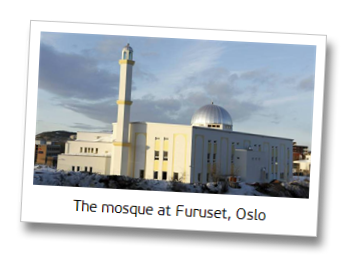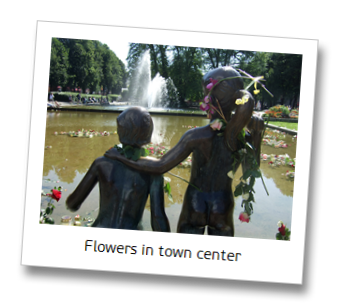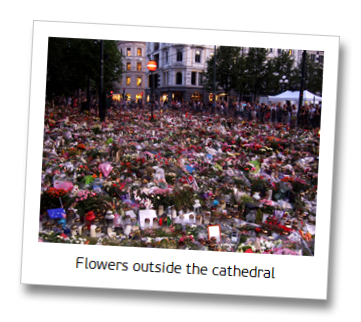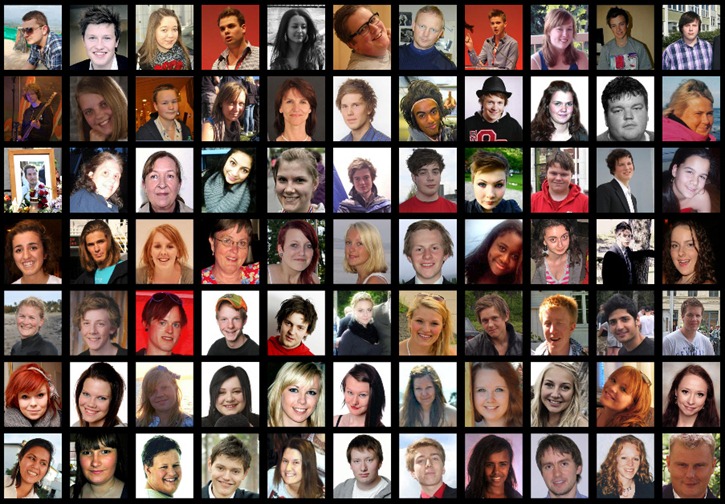About a week prior to the Oslo terror on July 22, I was in a part of town I rarely visit. I was en-route to an exciting adventure at IKEA and was waiting for the bus that would complete my journey. As I was scanning the features of the recently erected mosque there, I noticed two young ethnic Norwegians walking towards me. They didn’t look particularly tough. Though they spoke “tough”. One of them was clearly afraid. I saw it in his eyes; they were wide with terror.
Two Norwegian kids in “Pakistan city”
“Did you see how he was looking at me?,” he told his small, plump friend. “I should never have come here. This is fucking Pakistan city!” His buddy proceeded to play cool and told him, as if aping a gangster, “Don’t worry, I have connections here. I know so and so and they’re really bad ass.”
It was a strange situation for me, because I didn’t feel even mild anxiety there. And there was something so sad and painful to me about listening to these two young men. They were right there beside me, but we were worlds apart.
I noticed, as they kept talking, that I felt compelled to inject myself into their world. I felt an urge to offer them some reprieve from their angst, to pass on some of the freedom that I know and give them a positive seed for the future. But I couldn’t find the right words.
I judge that in order to influence someone’s take on reality, we must first embrace and validate their existing one. I believe we can’t transform others from a starting point of completely rejecting their worldview. It just doesn’t work. But I didn’t quite know how to embrace their worldview and still maintain integrity with my own. To be honest, I still don’t. And to complicate matters further – I wasn’t even certain that what they were saying was nonsense. Maybe they had been in danger. Maybe a scared sixteen-year-old young Norwegian kid in “Pakistan city” stands out like a lighthouse. Truth is – I don’t know. The world they inhabit lies in mist beyond my own veil of ignorance and confusion.
In the end, we exchanged brief words, but I didn’t feel I left them with anything significant.
Those two boys unwittingly left their mark on me, for I felt with them a yearning to show up as a mentor, but I didn’t know how. In a way, that pain served as a turning point for me.
Hussein, the Iraqi Taxi Driver
Around the same time as my experiences in “Pakistan City”, I found myself in conversation with a young Iraqi taxi driver. I was late for my plane to Edinburgh, where I was to attend my Primary Integration Training with the Mankind Project and Hussein got me there in time.
I talk to people and so I hear stories. Hussein’s was about racism. He told me he would be exposed to racism on average 4-5 times a day. The day previously, a normal looking, polite Norwegian man my age had been in his back seat. Hussein told me he had suddenly asked him “When are you going back home?”. Hussein had started talking about saving up for going on holiday and how it was hard. Then the young Norwegian man replied “No, I mean – for good. I’ll help you get out of the country. Because you need to know that there will come a day not long from now when people like you will be shot down in the streets.” From the way Hussein told the story, it sounded like this young Norwegian man kind of liked the idea.
I was pretty shocked. I thought of the complete lack of empathy in this young passenger and as I see him before my mind’s eye telling tales of a future where immigrants are gunned down in the streets, I feel anger rise in my belly.
Hussein was a nice guy, but I didn’t like what he had told me.
Terror hits Oslo
As Hussein and the two boys in Pakistan city were on my mind, terror hit: A cynical and wildly disturbed Norwegian man attacked the headquarters of our government as he felt they had failed the nation by embracing multiculturalism. He did so with a massive car bomb that could be felt and heard miles outside of the city center. As if that wasn’t bad enough, he then proceeded to kill sixty-nine people in the spring of their lives on an idyllic island an hour’s drive from of Oslo. Visions of the island nightmare endured by those young kids will be forever etched into our nation’s collective memory.
We all thought Muslims had done it of course. But the terrorist was Norwegian, white, 32 and quite normal looking. That fact changed us.
While I haven’t studied it closely, I can say that the terrorist’s personality profile is unsurprising reading (at least to me). He was for practical purposes fatherless, insecure and carried enormous hatred behind his facade of well-adjusted politeness. Alone with himself, he became increasingly convinced that he had been given an almost messianic mission and that it was his burden to carry it out, even though he recognized it as gruesome. He was a failure in worldly terms and had to compensate in the realm of fantasy; one of his current demands is that in order to reveal all details in interviews with the police, he must first be made the ruler of Norway.
I have thought much about this man, henceforth referred to as “the terrorist”. My interest in him is partly personal. As I have shared elsewhere, when I was in my early 20s, I started slipping into an inner landscape that felt increasingly twisted. This happened while I was polite and well-adjusted on the outside. Many years later, I eventually understood that this was a symptom of an enormous repression of my inner primal masculine and all the wildness and sexuality that comes with it. Today, I treasure that period in my life as the seed to my current spiritual and psychological insights, but I remember I feared then that I would one day end up killing someone – such was the power of these repressed inner energies.
As I now think of psychotic mass murderers, school massacre perpetrators, and terrorists – especially the Western breed – I see that they tend to be the quiet ones. Their acts are generally met with surprise by those who know them, for they never let people in on their inner psychological world. That may be wise in a way, because they are unlikely to have anyone in their lives who will be able to listen and embrace what they have to share.
The terrible paradox is that these young men are generally the most spiritually attuned and sensitive among us1, but since no elder wise man is around to embrace them, recognize their gifts and show them the way through their transition, they are left alone with their over-stimulated, festering inner worlds. As a consequence, instead of seeing themselves as worthy, strong, beautiful men, they likely fear themselves and question their right to life. I observe them and suspect that most of them have strong masochistic tendencies.
Yet masochists, through the archetypal dynamics inherent in the human psyche, turn sadists in the end (exactly the impulse I feared in myself). It starts out innocent enough, perhaps as dreams of people, creatures, places or situations that symbolize suppressed inner energies. Thoughts and fantasies may start appearing in their waking world, of murder perhaps – or of brutal sexual acts. Eventually, these thoughts may start to intermingle with those we associate with normal day to day functioning and become more and more indistinguishable from gross reality.
And then suddenly one day, perhaps in the blink of an eye – or perhaps as a long and gradual buildup – this deep, primal psychic material – twisted out of shape – comes shooting like a tsunami through our repression barrier. Its energies overcome the ramparts of the ego structure, much like flood water conquers a dam, and then comes thundering down the riverbed of everyday life.
If the collapse of the repression barrier comes suddenly, the man may come to his senses with a smoking gun in his hand. He may then plead temporary insanity. In reality, it would be more precise to say that he was hijacked by the force of his own suppressed psychic material. And since few will tell him to now embrace the psychic material that turned him “mad” to begin with (e.g. his feelings of vulnerability, anger and fear), his madness will likely escalate with time. I believe only grace, enormous suffering, or the intervention of a powerful elder (like the monk that beats his murderous disciple in Spring, Summer, Autumn, Winter… and Spring) would change this man’s trajectory through life.
If the collapse of the repression barrier happens over time, like a trickle of water that arrives in darkness until it one day comes seeping through the floorbords, the man might gradually cease to function like a normal human being and become instead victim of a more consistently evil archetypal shadow system. With buildup over time, I believe a man becomes able to sustain his delusions and stabilize them as everyday “reality”. Sudden experiences of “losing it” are not part of these men’s psychological profile; they are consistent in their psychopathy.
In such a way, a man with a poor self-image gradually designs a fantasy world in which his alter ego can rule supreme. He will project his inner weakness onto others and may start to see himself as superhuman. He will then despise the weakness he sees in others (which is largely his own) and may grow to consider huge parts of the population as unfit for life. He may then pursue his vision, which may involve ridding the earth of an entire ethnic, religious or ideologic group, essentially in order to create a world that doesn’t feel threatening for the kid in him that he has denied and stowed away in a dark inner dungeon.
With fear as his motivation and empathy locked down in the same dark dungeon as that wounded child, the man will chase, when threatened, his own projections unrelentingly – to the point, perhaps, of laying waste to dozens, or millions, of human lives in a calculated and organized fashion. It is a terrible and tragic irony that a man’s view of himself as superhuman comes as a hard counter to a profound sense of inferiority. The terrorist and Hitler are similar in this regard. Consumed by archetypal shadow, their sole purpose remains to attack those that remind them of the fact that they are really but wounded children.
When we come to grasp the dynamics of the human mind and soul in such a way, the Oslo terror becomes, if possible, an even greater tragedy. For we may then see the outline of something so soft and vulnerable in us all that we spend vast energy suppressing. As our eyes adjust to the dark, we may be reminded of the words Jesus spoke so long ago: “You must become like little children to enter the kingdom of Heaven”. To become like little children is, in my judgment, to embrace that inner vulnerability and all the playfulness and wonder that are its siblings. And our refusal to do so is what keeps the gates of Heaven locked.
The most important difference between us and the terrorist is that he takes the suppression of what is most beautiful in himself (a part which is always inextricably linked to his wounds) further than we do. That, I judge, became his personal hell. And when we realize that this terror would likely not have happened if the terrorist was honest enough to admit “I feel afraid”, it should break our hearts.
Norway lost 77 lives that day, most of them youths. For the bereft, only tears and memories remain.
…and then The London Riots came
When I heard news that people were looting and immolating buildings on the streets of London, I suspected right away that the majority of the rioters were young men. Now it turns out that a lot of young women were involved too, but locals I’ve spoken to have gone some way in confirming my initial suspicions.
To improve our understanding of what happened in London – and to find a way to connect the dots between these events I have described – it’s essential that we now examine a much maligned part of men: his inherent primal masculine. 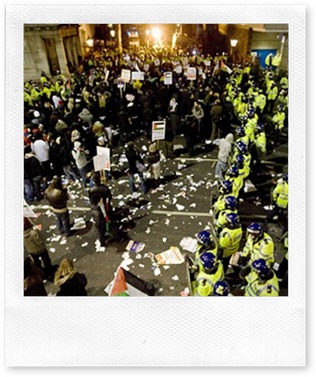
There is a wildness that exists in all men. It’s the wildness of Iron John and for the ones who don’t understand men, it may seem as a chaotic and violent energy. But the true Wild Man puts a man in touch with his emotions and makes him a courageous and powerful force of good in the world. He may not be a politically correct force of good, but a force of good nevertheless.
Every good woman looking for a man and every young man looking for a mentor secretly yearns for this Wild Man quality. Some young men may find it in a martial arts sensei or an unusually powerful teacher or youth club leader. I judge that the truest parts of us always appreciate the Wild Man quality, for it represents a man’s heart and soul – and we intuit that such things are important. Indeed, for those of us who have successfully evaded society’s attempts at brainwashing us with its anti-male propaganda, this force is extremely benevolent.
Yet the Wild Man is feared by liberals and conservatives alike. In the postmodern world, this ancient energy is under attack by naive socialogists who think, entranced by nonsense PC ideals, that people are born as blank slates. If you then think that all the ills of the world are caused by men, and that this wildness seems a lot like the destructive force you are trying to combat, the path to thinking that you can remove the wildness from a man by changing his social conditioning is short. What these confused ideologues then do is treat a boy as a broken girl and suppress a big part of him, force-feeding him the idea that if he were more like a girl, things would be better2. It is likely that the boys affected will harbor anger and bitterness towards the world as a result. They have after all been under attack by the very people whose job it is to protect and teach them. This anger will often be hidden behind a veneer of nice (passive aggression) and will sometimes be expressed as rebellion.
The institutionalized war against boys I just described cannot, despite the wishes of those who have made it their jobs to hurt men, alter the fabric of reality. And reality is that for a boy to grow up to be a loving and responsible man there is nothing more important to him than to feel authentically powerful. The man who feels weak, as it so happens, is out of touch with his true heart and soul. He becomes a talking head who enjoys intellectual masturbation as well as the occassional ejaculation. But authentic feelings of love and empathy are hard for him to access. Some end up as raging and rebellious, which would aptly describe the London rioters. Some end up as emotionally numb, yet seemingly well-adjusted narcissists, which seems to aptly describe the Oslo terrorist – and a frightening amount of politcians and CEO hotshots. And yet some end up as chronically nice and sensitive, trying to live the life of a man on the terms of a woman.
Although it doesn’t excuse their behaviour, these rioters clearly have not been shown their power and their beauty by an elder. And when the authentic, benevolent force of the inner Wild Man has not found a healthy expression in a man’s psyche, it comes out sideways, as truly destructive behaviour. Modern politicians, sociologists, feminists and gender “experts” are doing their best to take a man’s power away from him, but only a man who doesn’t feel authentically powerful is a threat to society.
The promise of initiation
The promise of initiation and authentic ritual process is that they connect a man to his inner Wild Man energy. Thus a man learns, metaphorically speaking, how to wield a sword and dance at the same time. He also finds his rightful place under the stars, among the trees and the animals. But after the onset of the industrial revolution, we don’t teach that anymore. With machines now running our lives, we seem so hypnotized by the distractions of “civilization” that we have completely lost touch with the soulful nature-energy required for sword-wielding dances. That energy predates machines. And it will outlive machines. For it is like a slow, eternal, cosmic hum at the source of the world – and its promise is to return us to right relationship with creation itself. Deep down, every man’s soul knows this and it is this knowing combined with the facts of modern life that trigger our modern epidemic of depression.
There are no excuses for killing 77 people to avoid facing yourself or for burning buildings for shits and giggles and plasma televisions. And yet, there is something to be learned from this: A society that doesn’t take the challenge of its young men seriously is walking a precarious path towards its own destruction. And if the way men and boys are falling behind in society in virtually every measurable way is any indication, we have a rocky path ahead.
Here in Norway, the wave of love that washed over us after the July atrocities has been amazing. It has touched me in ways I didn’t expect and I have been proud of the people I’m a member of. Yet one fact remains – the best defense in the public eye to prevent this from happening again is more tolerance and more multiculturalism. That surely sounds nice, but I don’t agree that it will make us safe from harm. For that to happen, I judge we must look for ways to accept responsibility for what happened3 and from that place of maturity start mentoring and initiating our boys so they become beautiful, powerful men.
It would do us well to honor the enormous psychological turmoil inherent in the process of becoming a man – and to realize that a society in which men are exposed to concerted efforts to make them doubt their power and beauty is in serious trouble. To stop our young men from feeling and causing terror, new answers must be sought. Now is the time.
1. Robert Moore tells us in his volume on the Magician archetype that old native cultures chose its shamans amongst the young men who displayed the greatest signs of psychological instability. They did that because they knew these men would be the most empowered shamans once aided through their psychological turmoil.
2. This may start in kindergarten where employees may shame the more aggressive play style of boys and instead tell them to be quiet and behave. It continues from there throughout school where an ability to sit still and keep your mouth shut is preferred over active play and self-expression. That has huge consequences for the many boys who are more physical than cerebral. Instead of having their inner gold mined, they are shamed for being full of energy.
3. Accepting responsibility for the Oslo terror would involve accepting that the difference between you and I and the terrorist is way smaller than we’d like to think. It would also involve accepting that we have created a society where a person can be driven to such an extreme. There is a huge shadow side of our so-called civilized and humane society here to be explored. Consider that the less able you are to feel shared humanity with the terrorist, the more likely you are to be in denial of the same primal energies that operate within yourself.

